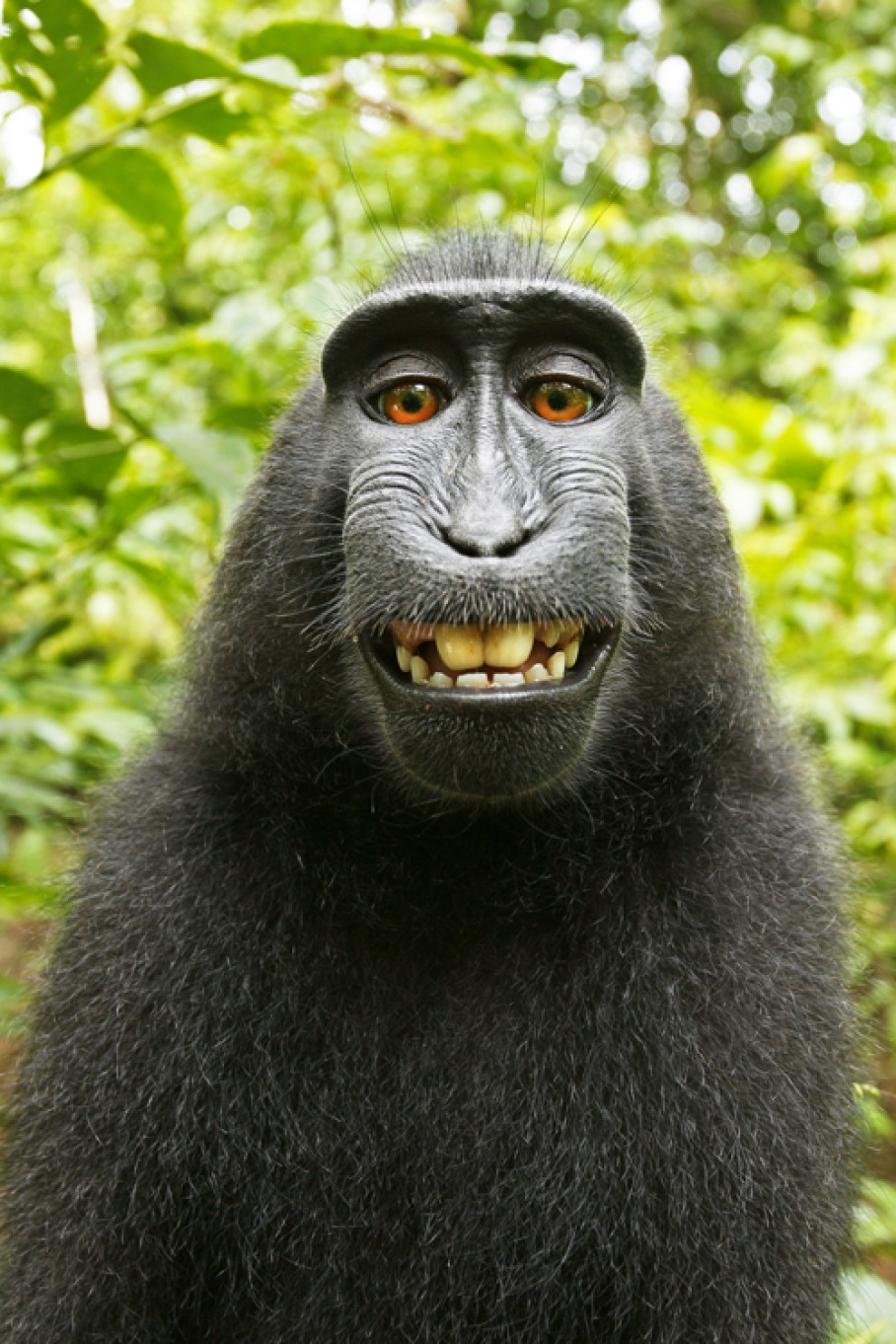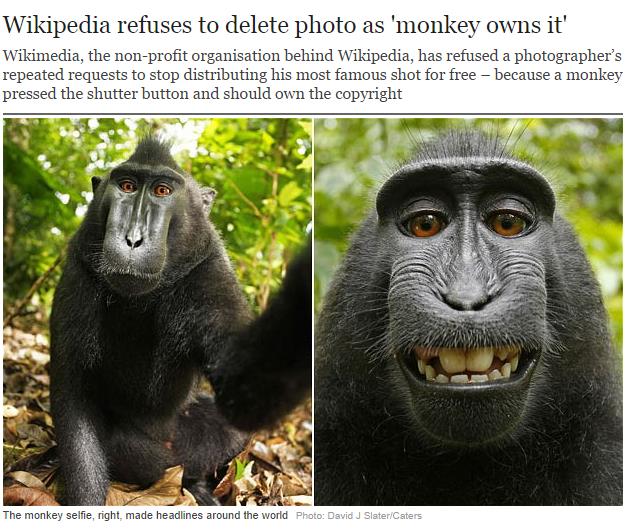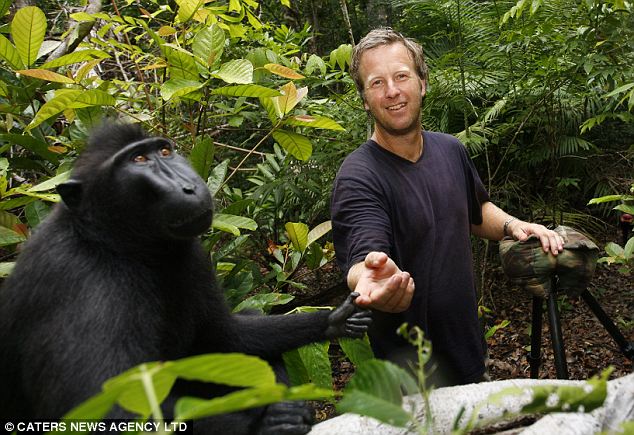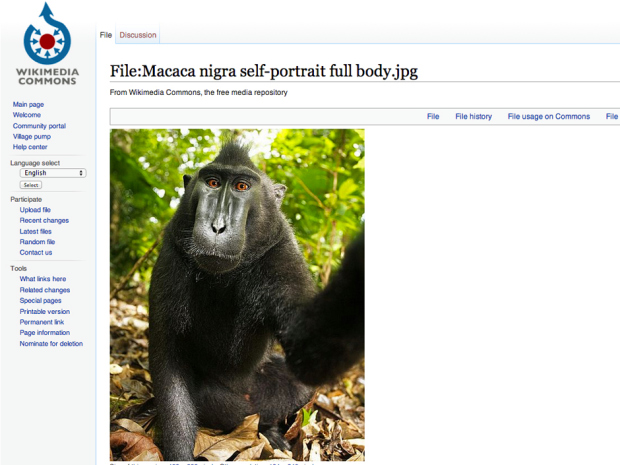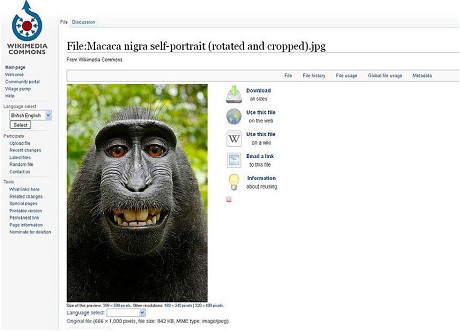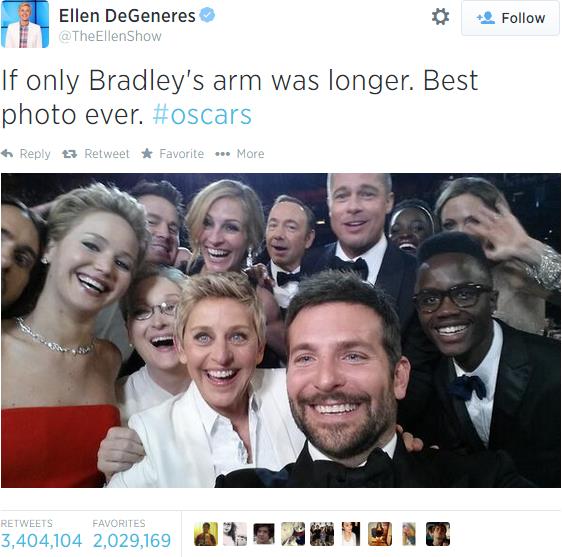If A Monkey Takes A Selfie, Who Owns The Copyright? The Monkey Or The Camera Owner?
Copyright law can be obscure, but nothing could have prepared British photographer David Slater for what would happen after a monkey stole his camera in Indonesia to take a selfie.
In 2011, Indonesian macaques snatched David J Slater's camera and started taking pictures of themselves. One of them – a selfie taken by a crested black macaque – has since gone viral.
Staring straight into the camera, with lips pulled back into a grin, it could be regarded as a perfect “selfie.” The series of “self portraits” of a crested black macaque monkey were shared around the world over the Internet and on social media. But the now famous images are at the centre of a bizarre dispute over who owns the pictures.
The Telegraph says that Wikipedia denied a notice-and-takedown request from Slater, a professional nature photographer, because the monkey owns copyright on the disputed photo
However, as The Guardian notes, this is not really true. Wikipedia has actually claimed that the photo is uncopyrightable, since current US Copyright Office policy is that animals can’t own copyrights.
According to Copyright Compendium § 202.02(b): The term ‘authorship’ implies that, for a work to be copyrightable, it must owe its origin to a human being. Materials produced solely by nature, by plants, or by animals are not copyrightable.
copyrightcompendium.comSlater, however, has objected to this interpretation:
“A monkey pressed the button, but I did all the setting up.”
According to Slater, ownership of the photo should vest in him, given the serious financial investment that led up to the photo:
“That trip cost me about £2,000 for that monkey shot. ... Photography is an expensive profession that’s being encroached upon. They’re taking our livelihoods away.”
The photographer claims he's suffered considerable expense to secure the photos. The fact that they have been, essentially, distributed for free on the Internet through the Wikimedia Commons Web site has cost him untold amounts of money.
“This is ruining my business,” Slater told The Post on Wednesday. “If it was a normal photograph and I had claimed I had taken it, I would potentially be a lot richer than I am.”
washingtonpost.comIn 2011, Slater traveled to Indonesia and spent three days following the animals with his camera equipment and a tour guide
One day, he said, he set up a tripod and walked away for a few moments. When he returned, the monkeys had grabbed his camera and started snapping pictures. Thus, the monkey selfie was born. That amazing story took off in media reports.
The most iconic of the images was featured by The Guardian, the Telegraph and Huffington Post, among others
David Slater claims the inclusion of two monkey selfies in Wikimedia — a media library that allows other websites to use photos free of charge — is harming his ability to make a living.
Image via nationalpost.comSoon enough, it showed up on Wikipedia — first on the page for the species of monkey, then on Wikimedia Commons, which hosts images in the public domain.
washingtonpost.comIn early 2012, Slater officially asked Wikimedia to take down the image. It was removed, but was later added again by another user. This time, it remained on Wikimedia Commons.
telegraph.co.ukSlater also tangled with the Techdirt, which first claimed that Slater could not own the copyright of an image taken by an animal
“The background in my opinion is that they’re communists, they don’t believe in property, they don’t believe that artists should have rights to their work,” Slater said of Techdirt in particular.
washingtonpost.comIn 2011, when Techdirt first received a request from Caters News Agency (which licenses Slater’s photos) to take down the image, it issued this response: The whole post was about whether or not anyone had a legitimate copyright claim on the photos, noting that the photographer, David Slater, almost certainly did not have a claim, seeing as he did not take the photos, and even admits that the images were an accident from monkeys who found the camera (i.e., he has stated publicly that he did not “set up” the shot and let the monkeys take it). And yet, Caters News Agency has a copyright notice on two of the images, claiming to hold the rights to them. We doubted that the monkeys — who might have the best “claim” to copyright on these photos, if there is one, had licensed the images.
techdirt.comSlater's dilemma highlights the murky and perilous landscape of intellectual property rights in the digital era. Remember this famous Ellen DeGeneres' Oscar selfie? As The Washington Post reports:
There is still uncertainty about whether actor Bradly Cooper (who actually pushed the button) owns the image, or if perhaps DeGeneres could make the case that Cooper was temporarily contracted as an employee in her service for the purpose of taking that photo.
washingtonpost.comWikimedia Foundation's Chief Communications Officer Katherine Maher said the organization is confident that the legal basis for denying Slater's request is sound, because the person that takes the photo should own the copyright. But a person didn't take this one.
“Monkeys don’t own copyrights,” Maher said. “What we found is that U.S. copyright law says that works that originate from a non-human source can’t claim copyright.”
According to Maher, Slater would have had to make “substantial changes” to the image — beyond cropping, color correcting and other cosmetic adjustments — in order to own the copyright over the changed product.
“So what we found was that if the photographer doesn’t have copyright and the monkey doesn’t have copyright then there’s no one to bestow the copyright upon,” Maher said. Thus, the lawyers validated what Wikimedia Commons’ editor community had determined to be a public-domain reasoning for leaving the image up.
washingtonpost.comHowever, not everyone in Wikimedia's community agreed with the decision to keep the image up. Some did in fact back Slater's copyright claims.
One user, Saffron Blaze, said in a comment section associated with the photo: "I am not sure I am convinced by the no copyright argument. In this case the outcome was very disrespectful of the photographer who created the conditions that allowed these photos to be created. There are some jurisdictions where even the monkey could be imbued with the copyright as its creator."
telegraph.co.uk